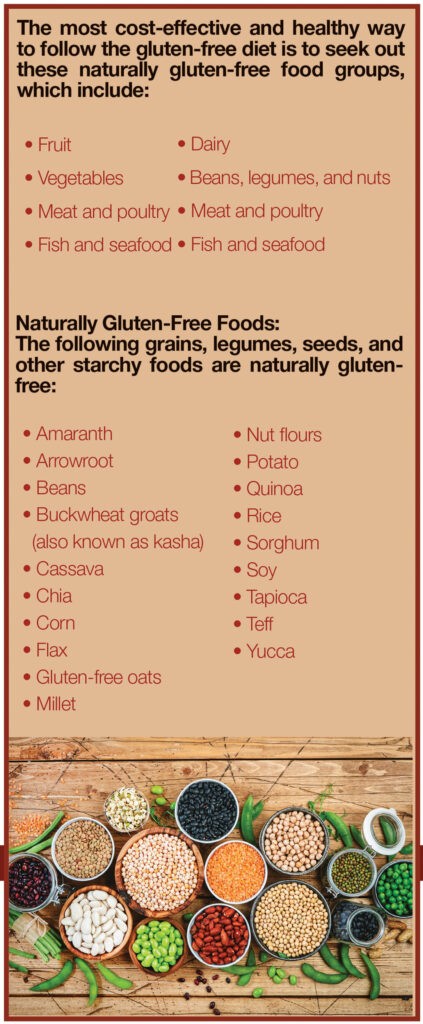Celiac Awareness Month is in May

Lila had always been a healthy and active person, with a passion for hiking, skiing, and exploring the outdoors. However, in her early thirties, she began to experience a range of troubling symptoms, including abdominal pain, bloating, and diarrhea. At first, she assumed that these symptoms were just a temporary inconvenience, but over time, they began to take a serious toll on her quality of life.
Lila visited multiple doctors, who ran a battery of tests and prescribed various medications, but none of them seemed to offer much relief. She tried changing her diet, eliminating certain foods, and trying different supplements, but nothing seemed to make a difference.
Finally, after months of searching for answers, Lila visited a gastroenterologist who suggested that she might have celiac disease. The doctor explained that celiac disease is an autoimmune disorder that causes damage to the small intestine when gluten, a protein found in wheat, barley, and rye, is consumed. This damage can cause a range of symptoms, including abdominal pain, bloating, diarrhea, and more.
Lila was skeptical at first but decided to get tested for Celiac disease. To her surprise, the test came back positive, and she was diagnosed with the condition.
Although the diagnosis was a shock, Lila was relieved to finally have an explanation for her symptoms. She began to learn more about Celiac disease and the gluten-free lifestyle that people with this condition must follow and started to make changes to her diet.
At first, living a gluten-free lifestyle was a challenge. Lila had to carefully read labels and avoid many of her favorite foods. She struggled to find gluten-free options when eating out and had to learn how to cook and bake using alternative ingredients.
However, over time, Lila began to adapt to her new lifestyle. She discovered new foods and recipes that she loved and found ways to make gluten-free versions of her favorite dishes. She also began to connect with other people with celiac disease, both online and in person, and found a supportive community that helped her to navigate the challenges of living with this condition.
Today, Lila is doing well and can enjoy an active and healthy lifestyle once again. Although living with celiac disease can be challenging, she has learned to embrace her gluten-free lifestyle and to find joy in the foods and activities that she loves.
Celiac Awareness Month is observed every May, and it is a time for people to come together and raise awareness about celiac disease. This is an important month for people in Kansas City and around the world to learn more about celiac disease, its symptoms, and the gluten-free lifestyle that many people with this disease have to follow.
WHAT IS CELIAC DISEASE?
Celiac disease is an autoimmune disorder that affects millions of people around the world. It is a condition that causes damage to the small intestine when gluten, a protein found in wheat, barley, and rye, is consumed. This damage can cause a wide range of symptoms, including abdominal pain, bloating, diarrhea, constipation, and more. Celiac disease can also lead to other serious health problems, such as osteoporosis, anemia, and even cancer if it is not properly managed.
The good news is that Celiac disease is treatable and can be managed by following a gluten-free diet. However, this can be a difficult and costly lifestyle change, and it is important for people to understand the challenges that come with this disease.
During Celiac Awareness Month in Kansas City, there are several events and activities that take place to raise awareness about celiac disease and to support people who are living with it. These events can be great opportunities to learn more about celiac disease, connect with others who have this condition, and get involved in the community.
One of the key events that takes place during Celiac Awareness Month in Kansas City is the Gluten-Free Food Expo. This event brings together local and national vendors who offer gluten-free products, allowing attendees to sample and purchase gluten-free food and other products. This event is a great way for people to discover new gluten-free products, learn more about living a gluten-free lifestyle, and connect with other members of the celiac disease community.
In addition to the Gluten-Free Food Expo, there are also a few educational events and workshops that take place during Celiac Awareness Month. These events are designed to help people learn more about celiac disease, the gluten-free lifestyle, and how to manage this condition. Topics may include tips for eating out, strategies for cooking gluten-free meals at home, and resources for finding gluten-free products in Kansas City.
Another important aspect of Celiac Awareness Month in Kansas City is advocacy and fundraising. This may involve organizing events to raise funds for celiac disease research or working to advocate for better understanding and support for people with celiac disease. By working together, people in Kansas City can help to increase awareness and understanding of celiac disease and make it easier for people to live with this condition.
There are also several support groups and resources available in Kansas City for people with celiac disease and their families. These groups can be great places to connect with others who are living with this condition, share tips and advice, and find emotional support. Many of these groups offer regular meetings and events throughout the year, as well as online forums and social media groups.
For people with celiac disease, living a gluten-free lifestyle can be challenging, but it is also an opportunity to explore new foods and recipes, and to take control of their health. By participating in Celiac Awareness Month in Kansas City, people can learn more about this condition, connect with others who have it, and find the resources and support they need to live a healthy, fulfilling life.
Celiac Awareness Month in May is an important time for people in Kansas City and around the world to learn more about Celiac disease and the challenges that people living with this condition face. By raising awareness and supporting people with celiac disease, we can help to make this condition more manageable and improve the lives of those who are affected by it. Whether it is through attending events, advocating for better understanding and support, or simply learning more about celiac disease, there are many ways that people in Kansas City can get involved in Celiac Awareness Month.
One of the most important things that people can do during Celiac Awareness Month is to educate themselves about celiac disease and the gluten-free lifestyle. This can involve attending workshops and events, reading articles and books about Celiac disease, and connecting with others who have this condition. By learning more about Celiac disease, people can better understand the challenges that people with this condition face and find ways to support and advocate for them.
There are many organizations that work to support people with celiac disease and to raise awareness about this condition. By getting involved with these organizations, people in Kansas City can help to fund celiac disease research, advocate for better understanding and support for people with this condition and make a difference in the lives of those who are affected by celiac disease.
Support groups can also be an important resource for people with celiac disease and their families. These groups offer a safe and supportive environment where people can connect with others who have this condition, share their experiences, and find emotional support. Support groups can be a great way to find tips and advice for living a gluten-free lifestyle, as well as information about resources and events in the Kansas City area.
It is important to remember that living with Celiac disease can be a challenging and isolating experience. For people with this condition, even small amounts of gluten can cause serious health problems, making it difficult to eat out or attend social events. By reaching out to people with celiac disease and offering support and understanding, we can help to make their lives easier and more fulfilling.
Celiac disease affects approximately 1% of the global population, or about 3 million Americans. However, many people with celiac disease remain undiagnosed, with estimates suggesting that up to 80% of people with celiac disease are undiagnosed or misdiagnosed with other conditions.
Untreated celiac disease can lead to serious health problems, including osteoporosis, anemia, and even cancer. However, following a gluten-free diet can effectively manage celiac disease and prevent these complications.
Living a gluten-free lifestyle can be challenging, with many foods and products containing hidden sources of gluten. It can also be more expensive, with gluten-free products often costing more than their gluten-containing counterparts.

Fortunately, awareness of celiac disease is growing, and there are now many resources available to help people with this condition live a healthy and fulfilling life. By raising awareness about celiac disease and supporting people with this condition, we can help to make life easier and more manageable for those who are affected by it.






